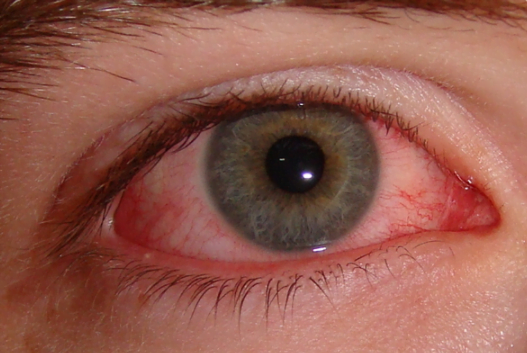Blurry vision
If you notice that your vision is blurry on a regular basis, this could be due to short or long sightedness. In these cases, an eye test is recommended to correct your sight for the clearest, sharpest and most comfortable vision.
Sudden onset of blurry vision should be considered serious and you should seek medical attention immediately.
If one eye goes suddenly blurry, or you notice a cloud or curtain over your vision, this could be due to a retinal problem such as retinal detachment, or a medical condition like a stroke. In both cases this is classified as an emergency and you should seek urgent medical attention.
If your blurry vision comes and goes, this could be related to tiredness, dry eyes, lack of sleep or eyestrain.
TIP: If you experience a sudden onset of blurry vision, or even occasional blurry vision, book an appointment for an eye test.
Gritty eyes, or feeling something is in your eye
This is commonly due to dry eyes. Lack of uniformly good quality tears causes these symptoms.
People with medical conditions like rheumatoid arthritis or fibromyalgia can also experience dry eyes.
TIP: Book a dry eye assessment appointment. Your optometrist will assess your tear film quality using various techniques and advise the best way of management, specific to your eyes.

Burning sensation in your eyes
Dry eyes, an allergy and lack of sleep or tiredness, frequently cause burning eyes.
TIP: First try lubricating eye drops from your optician or pharmacist. If your symptoms persist, book yourself an eye test to investigate the cause.
Sharp or dull pain
Pain in your eyes can described as being:
- sharp
- dull
- stabbing
- or throbbing in nature.
If you have pain and redness in your eyes, you should have an emergency eye test, or go straight to the emergency eye department at the hospital.
If you experience pain whilst moving your eyes in different positions of gaze, this could be due to inflammation of any of your inner eye structures. This would also indicate an eye test is needed to rule out any underlying problems.
Spots or strands moving about in your vision
Spots, bits, cobwebs or threadlike strands moving around in your vision are referred to as floaters. Your eyeball is filled with a clear jelly called the vitreous and floaters are found within this jelly. Floaters are small protein or other particles, which are semi-transparent.
As we all get older, the vitreous shrinks and becomes more fluid. Which means these floaters can easily move around in your eyes and you can see their reflections.
If you ever notice a sudden increase in floaters, with flashes of lights and a mist, or curtain, over your vision, this needs to be taken very seriously. You should book an emergency eye test appointment, or go straight to the emergency eye department at the hospital. This can be indicative of a retinal problem, like retinal detachment.
TIP: If you regularly see floaters in your vision, you should book an appointment for an eye test. Your optometrist will put drops in your eyes to dilate your pupils, so that a detailed examination of your retina can be done.
Something in your eye
Getting dust particles in your eyes, or something of similar nature, can usually be resolved by irrigating, rinsing your eye with water or saline. If you get a piece of metal, thorn or any objects which cause severe irritation and pain you must see your optometrist urgently.
TIP: If you have a foreign body in your eye:
- Don’t rub your eyes
- Don’t try to take the foreign body out
- Book an emergency appointment with your optometrist
My arms are not long enough?
If you are having difficulty focusing on near objects like books, electronic devices like iPad and Kindle then this could be indicative of presbyopia. This is when the crystalline lens inside your eye losses its elasticity and the surrounding muscles become more rigid. Normal signs include near objects look blurry, eyestrain and fatigue.

Red and bloodshot eyes
There are many causes of red or bloodshot eyes. The main causes include:
- Eye infection
- Eye allergies
- Broken blood vessel
- Injury/ trauma
Eye infection – Conjunctivitis is one of the most common eye infections. The common symptoms for this and other eye infections include itching, stinging, foreign body sensation, sticky eye due to discharge, swelling and watering. The eye infection can be viral, or bacterial and can also be contagious.
TIP: Book an eye test with your optometrist to confirm the type of infection you may also need to be referred to a doctor or specialist. Avoid rubbing your eyes and sharing towels with anyone.
Eye allergies – The common symptoms of allergies include itchy eyes, red eyes, watery and puffy. The allergy can vary considerably from seasonable plant allergy, or all year round dust or pet allergy.
TIP: See your doctor for advice on the type of allergy that may be affecting you. Cold and wet compresses on your eyelids whilst your eyes are closed can also help. Taking antihistamines from the chemist can also help.
Broken blood vessel
If you notice your eye is bloodshot, and all, or a section of your eye is totally filled with blood. This is called a sub-conjunctival haemorrhage. This type of problem often looks scary in the mirror, but is nothing serious and you shouldn’t worry about it.
TIP: If you have a bloodshot eye with no history of any injury or foreign body in your eyes, you should see both your optometrist and doctor. It is important your optometrist examines your eyes to confirm there no underlying causes. Also, your doctor should check for any medical conditions that could cause it like high blood pressure.
Eye injury/trauma
If you have a foreign object hit your eye, especially if it’s with great force, you should see your optometrist for an emergency appointment. There could be both damaged caused to the outside surface of your eye, as well as hidden damage caused to the retina, like retinal detachment.
TIP: If you are suffering from a lot of pain, place a cold compress on your eyes. Try not to rub your eyes. Seek medical attention either see your optometrist or emergency department at the hospital.



